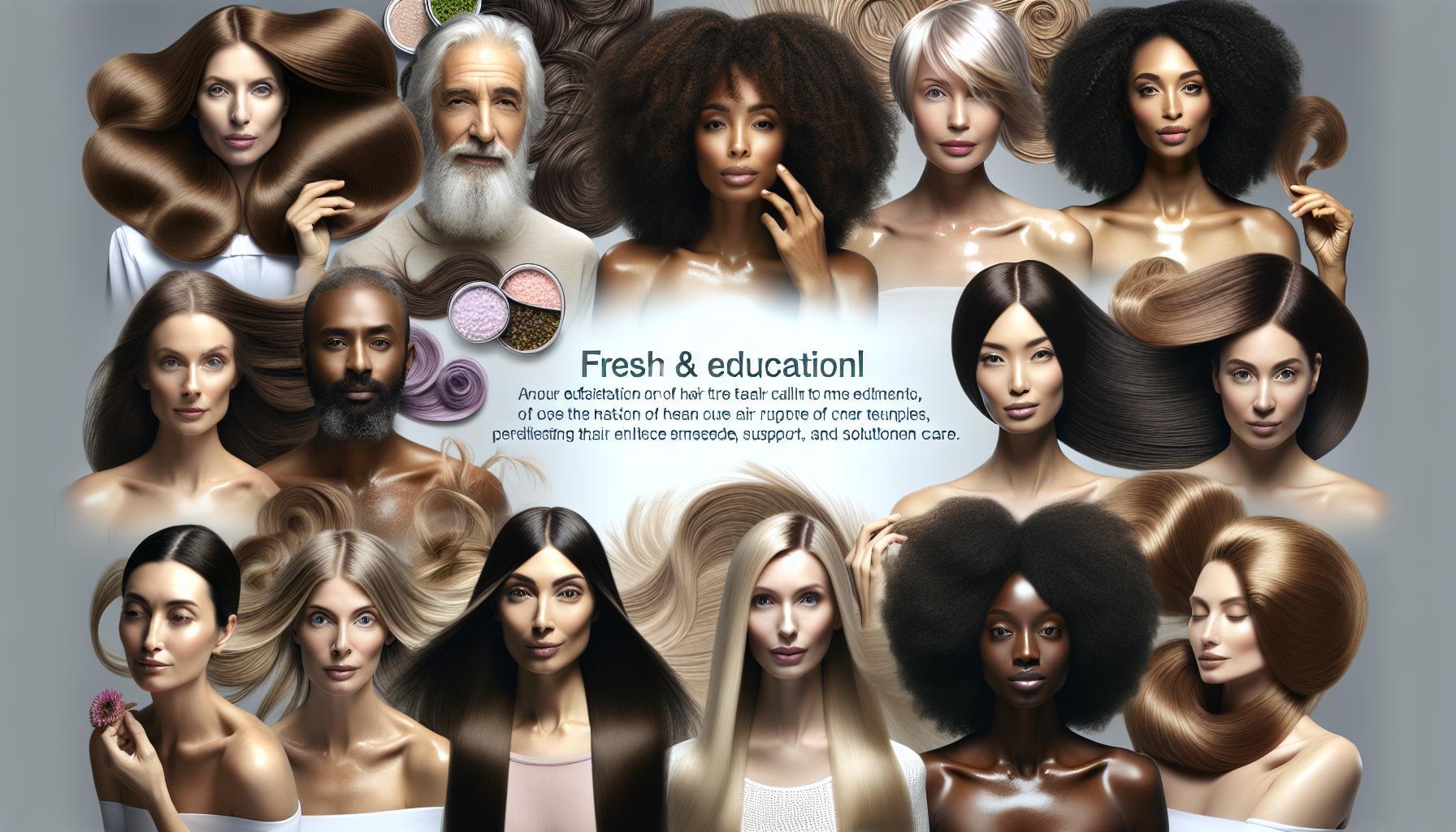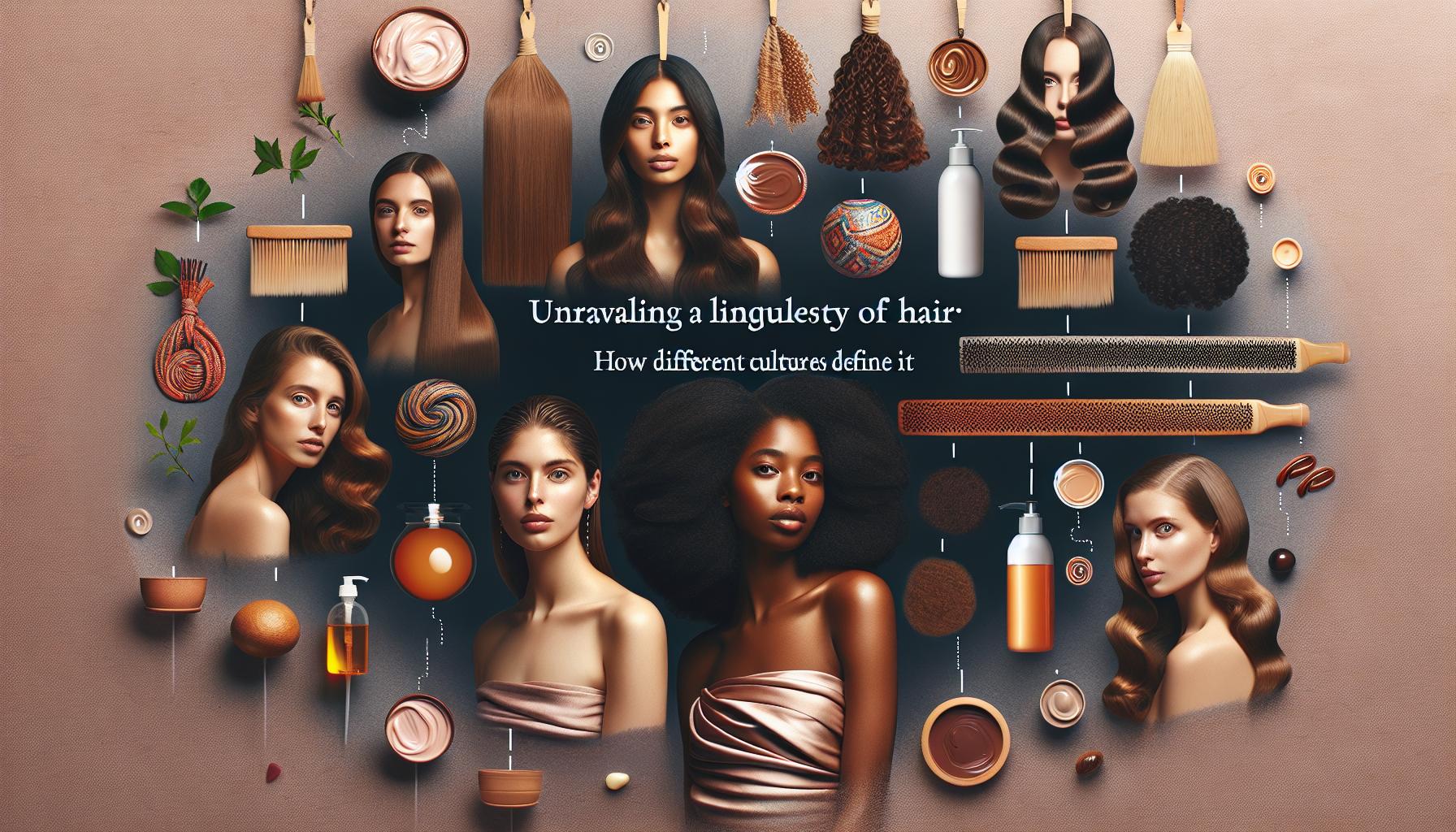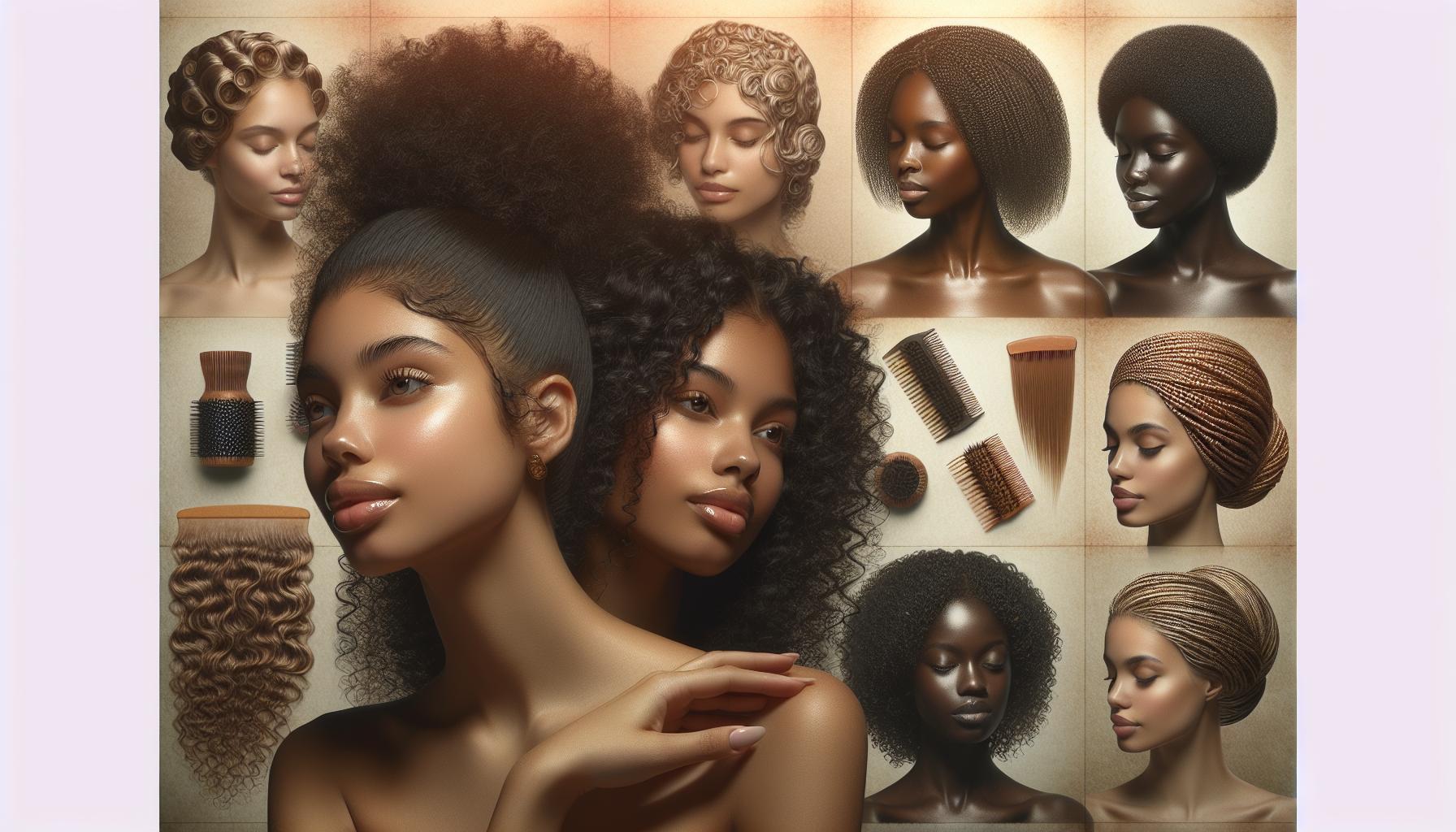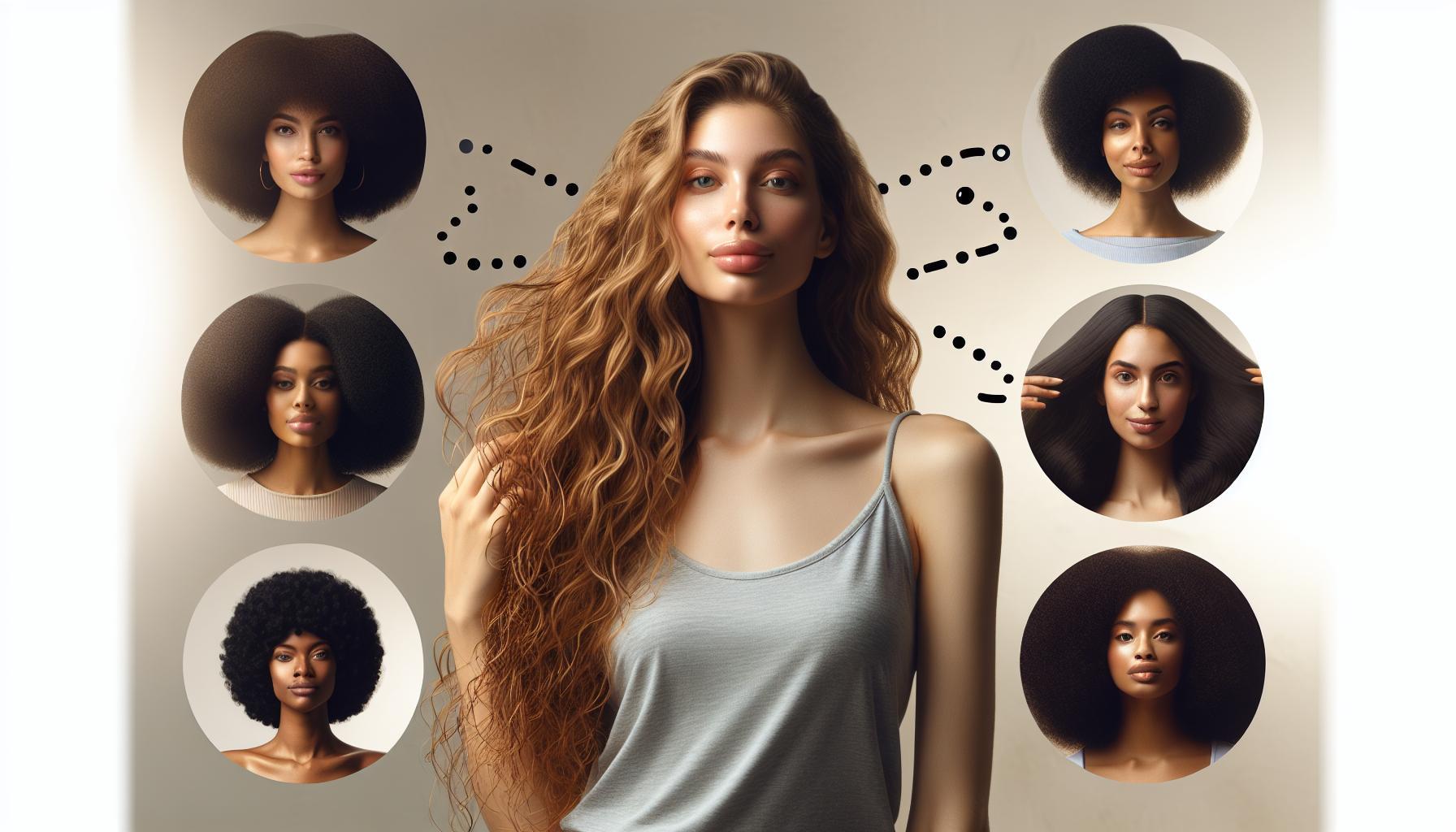Every culture carries its own significance and symbolism through names, especially when it comes to something as global as hair. From the delicate strands of a child’s first haircut to the majestic locks of tradition, exploring what names reflect hair in various languages unveils deeper connections to identity and heritage. Discover the rich tapestry of meanings behind these names and their relevance in today’s world.
Contents
- Unraveling the Linguistic Tapestry of Hair: How Different Cultures Define It
- The Symbolism of Hair: Cultural Significance Across the Globe
- Hair Terminology Through the Ages: Historical Perspectives in Different Languages
- A Closer Look at Indigenous Terms for Hair: Wisdom from Ancient Roots
- Modern Slang and Trends: How Contemporary language Shapes Our Understanding of Hair
- Emotions and Expressions: The Role of Hair in Personal Identity Across Cultures
- Hair Care practices around the World: What Names Reveal About Cultural Rituals
- From Folklore to Fashion: Stories Behind Hair-Related terms in Various Languages
- Faq
- What names mean hair in different cultures and languages?
- Why does understanding hair names in different cultures matter?
- Can I find traditional names that mean hair?
- What do hair names symbolize in different cultures?
- How can I choose a name connected to hair for my child?
- What languages have unique words for hair?
- why do some names associated with hair have deeper meanings?
- Concluding Remarks
Unraveling the Linguistic Tapestry of Hair: How Different Cultures Define It
Few elements of human culture are as universally meaningful yet as uniquely interpreted as hair. It serves as a potent symbol intertwined with identity,heritage,and status. Across the globe, different cultures possess distinctive words and meanings that reflect their relationship with hair, often revealing deeper societal values. The variety of terms illustrating what names mean hair in different cultures and languages showcases a vibrant linguistic tapestry that encapsulates cultural identities and traditions.
Exploring Cultural Significance
Different cultures not only identify hair with unique terminology but frequently enough ascribe broader significance to it. For instance, in many Native American tribes, long hair is a marker of spiritual strength and personal identity; its length can signify various life stages or social roles. Conversely, in some African cultures, intricate hairstyles signify community belonging or social status. The richness of this linguistic diversity helps illuminate how societies value hair and the roles it plays in self-expression and cultural heritage.
Diverse Terminology across Languages
Language plays an essential role in shaping how we view the world, and hair is no exception. Here’s a glimpse into how various cultures articulate the concept of hair, showcasing the differences and similarities that exist worldwide.
| cultural group | Word for Hair | Meaning/Significance |
|---|---|---|
| Japanese | 髪 (Kami) | The concept of hair often intertwines with beauty and status, especially in customary culture. |
| Spanish | Cabello | Refers to the hair on the head, with cultural significance in romantic and familial contexts. |
| Hindi | बाल (Baal) | Hair is associated with health and vitality, frequently linked to Ayurveda. |
| Mandarin Chinese | 头发 (Tóufà) | Hair represents a significant aspect of personal dignity and respect within family structures. |
The terms used in different languages do more than denote a physical characteristic; they encapsulate cultural narratives and value systems. For instance, the Hindi word “बाल” (Baal) connects to traditional wellness practices, showing a cultural emphasis on the relationship between hair and health. In essence, exploring what names mean hair in different cultures and languages reveals a profound interplay between language, culture, and personal identity.
Practical Considerations in Cultural Context
When engaging with diverse cultures, it’s essential to approach discussions surrounding hair with respect and awareness. Understanding the significance of hair in various societies can offer insights into personal and communal values, especially during events such as weddings or coming-of-age ceremonies.Here are some practical tips for navigating these conversations:
- Research the cultural backgrounds of the individuals you engage with to avoid misunderstandings.
- Ask respectful questions about hairstyles or hair care practices, which can encourage dialog.
- Recognize and appreciate the unique hairstyles and traditions as expressions of identity rather than merely aesthetic choices.
By immersing ourselves in the linguistic richness surrounding hair, we not only enhance our knowledge but also foster a greater recognition for the diverse cultural narratives that shape our world.
The Symbolism of Hair: Cultural Significance Across the Globe
The intricate tapestry of human culture often reveals itself in the most unexpected details, and one of the most revealing elements is hair. For many societies, hair serves as a canvas for self-expression, social identity, and even spiritual beliefs. Across the globe, the significance of hair varies widely, influenced by local traditions, historical narratives, and cultural values. Understanding what names mean hair in different cultures and languages uncovers a deeper appreciation for the roles these beliefs play in shaping identities and social norms.
Hair as a Cultural Expression
In various cultures, hair takes on meanings that extend well beyond mere aesthetics. For example:
- Indigenous Cultures: In several Native american tribes, long hair is a symbol of strength and pride. Each braid can represent different aspects of one’s life, including personal growth and spiritual journey.
- Asian Traditions: In some East Asian cultures, a shaved head can signify a monk’s commitment to spiritual growth and detachment from worldly possessions, whereas in places like Japan, elaborate hairstyles have historical ties to social status.
- Western Society: Within modern Western contexts, hair is often linked to individualism and can signify rebellion, creativity, or belonging, as seen in various youth subcultures over the decades.
spiritual and Symbolic Connections
Many cultures attach a spiritual significance to hair, viewing it as a conduit for energy or a reflection of the soul.For instance, in some African cultures, the way one styles their hair can convey numerous messages regarding their social ties, marital status, or even religious beliefs. The act of cutting hair can be considered a rite of passage or a mourning practice, symbolically severing ties with the past.
| Culture | Hair Symbolism | Names Meaning Hair |
|—————|————————————————|————————————|
| Navajo | Strength,identity,spiritual connection | “Yazzie” (dark hair) |
| Chinese | Connection to ancestors and heritage | “Fa” (hair) |
| Celtic | Vitality,beauty,or connection to the divine | “Sioda” (hair) |
In the context of analyzing what names mean hair in different cultures and languages,it’s fascinating to see how these definitions reflect broader themes of identity and belonging. names often encapsulate the cultural significance attributed to hair, intertwining personal identity with ancestral heritage and community values.For example, *Sesi* in some African cultures refers to hair, evoking themes of beauty and cultural pride.
In recognizing the symbolism of hair worldwide,we gain insight into how societies articulate values,aspirations,and spiritual beliefs through their diverse manners of expressing identity. Exploring what names mean hair in different cultures and languages enriches our understanding of this multifaceted human trait, showcasing the deep connections we harbor with our cultural roots and the narratives woven into the hair we wear.
Hair Terminology Through the Ages: Historical Perspectives in Different Languages
Throughout history, hair has been more than just a biological feature; it carries profound cultural significance and symbolism across diverse societies. Understanding the various terms used for hair in different cultures and languages allows us to appreciate each culture’s unique relationship with this defining aspect of identity. As a notable example, in ancient Egypt, hair was not only a sign of beauty but also an indication of social status, as illustrated by the various terms used to denote hair’s length, texture, or adornment.
The language of Hair: A Cultural Lens
Different cultures have developed distinct terminologies that not only describe hair but also reflect historical attitudes towards it. Here are some insights into how hair terminology varies by culture:
- Latin: In Latin, the word “capillus” signifies a strand of hair and is the root for many words in Romance languages. The romans even had specific terms for different hairstyles,such as “fascis” for braids.
- Japanese: In Japanese, “kami” (髪) means hair. It carries connotations of both physicality and spirituality, with the belief that hair holds significant life force. The expression “kami wo furu” refers to the act of letting one’s hair down, symbolizing liberation.
- Arabic: The Arabic term “شعر” (sha’ar) encompasses hair broadly but also includes poetic elements. In classical Arabic poetry, phrases describing hair frequently enough convey notions of beauty and longing.
- Swahili: In Swahili, “nywele” refers to hair. Traditionally, hairstyles can signal marital status or tribal affiliation, further entwining hair’s meaning with social identity.
A Table of Hair Terminology Across Languages
To appreciate the nuances of hair terminology, here’s a comparative look at how different cultures refer to hair:
| Language | word for Hair | Cultural Significance |
|---|---|---|
| French | Cheveux | Hair is often tied to elegance and fashion. |
| Chinese | 头发 (tóufǎ) | Hair symbolizes fortune; long hair is considered auspicious. |
| Hindi | बाल (bāl) | Hair plays a significant role in rituals and expressions of femininity. |
| Spanish | Cabello | Reflects beauty standards, with various terms for different hairstyles. |
Exploring the terms for hair across various languages not only enriches our knowledge of cultural differences but also highlights the universal human experience connected to this aspect of identity.As people across the globe continue to express themselves through their hair, understanding these linguistic nuances provides deeper appreciation for the cultural stories embedded within each strand.
A Closer Look at Indigenous Terms for Hair: Wisdom from Ancient Roots
Across various Indigenous cultures, the terminology surrounding hair is richly interconnected with identity, spirituality, and tradition. Each term not only describes hair but draws upon ancestral wisdom and the deep relationship many Indigenous peoples have with their natural surroundings. Exploring these terms reveals a tapestry of meanings that reflect the values and beliefs intrinsic to their cultures.
Understanding Cultural significance
In many Indigenous cultures, hair is far more than a mere physical attribute; it embodies personal and communal history.As a notable example:
- In Native American traditions, hair can symbolize strength and spirituality. The act of cutting hair can carry significant emotional weight, often marking a transition phase in a person’s life.
- In some Indigenous Australian cultures, hair is considered a connection to one’s ancestors, and certain styles or adornments may be chosen for ceremonial purposes that honor the individual’s lineage.
- Among various African tribes, hair can represent social status, maturity, and identity. Each hairstyle tells a story and can indicate tribe affiliation, marital status, or even personal achievements.
These cultural significances are pivotal in understanding the languages and terms used to describe hair.
Common Indigenous Terms for Hair
The following table highlights some Indigenous terms for hair and their meanings across different cultures, illustrating the diverse ways hair is conceptualized:
| Culture | Term | Meaning |
|---|---|---|
| Native american | Tahnee | Referring to hair; often symbolizes strength and bravery. |
| African (various tribes) | Wigani | A term signifying the beauty and cultural richness of hair. |
| Inuit | Qaqortoq | Means “white hair” and can denote wisdom, especially in elders. |
| Maori | Ringa | Refers to hair and often highlights the connection to one’s essence and identity. |
These terms not only reflect the languages from which they originate but also encapsulate the values associated with hair, serving a vital role in community rituals and personal expressions.
Practical Lessons and Reflections
Learning about Indigenous terms for hair encourages a deeper appreciation of its significance in different cultures. For those seeking to honor these traditions, consider reflecting on your own relationship with hair. Here are some actionable steps:
- Research the cultural significance of hair within your own heritage and community.
- Engage in discussions with Indigenous peoples to gain direct insight into their perspectives and meanings.
- Incorporate hair rituals or practices that resonate with your values and foster a sense of connection to your roots.
By embracing these varied meanings, we not only celebrate diversity but also help bridge cultural gaps, fostering a deeper understanding of what names mean hair in different cultures and languages.
Modern Slang and Trends: How Contemporary language Shapes Our Understanding of Hair
In a world where language is constantly evolving, the ways we describe physical features, particularly hair, can reveal much about cultural trends, identity, and self-expression.From the vibrant terminology used in contemporary fashion blogs to the playful slang popularized on social media platforms, language surrounding hair is not only varied but also heavily influenced by cultural interpretations. Understanding the names for hair in different cultures and languages deepens our appreciation for diversity and the narratives that accompany them.
One fascinating aspect of modern slang is how it co-opts traditional terms to create new meanings. For instance, the term “lace front” has emerged within conversations about wigs, blending fashion culture with beauty norms. This term originally referred to wigs with lace fronts that mimic a natural hairline, but among Gen-Z and millennials, it frequently enough gets thrown around in casual contexts to signify a polished, put-together look. Similarly, phrases like “hair goals” express a desired aesthetic that transcends mere hairstyles, often encapsulating broader aspirations about beauty and self-image.
Exploring Cultural Nuances
When we explore what names mean hair in different cultures and languages, we find that terms can convey not just description but also cultural significance. For example, in Japanese, the word “kaminari” (髪) denotes hair, yet it holds connotations of natural beauty and vitality, frequently enough associated with one’s heritage and individuality. Similarly, in many african cultures, certain hairstyles are indicative of status, age, and community belonging. Each term tells a story that reflects societal values and expectations—something that is increasingly echoed in modern slang.
Moreover, the rise of social media and platforms like TikTok has contributed to the rapid dissemination of hair-related slang, creating a new lexicon that bridges various cultures. Terms once exclusive to particular communities have gone mainstream,such as “box braids” or “fade,” showcasing how hair fashion translates across cultural lines. As users define and redefine their styles, they also challenge stereotypes, using language as a tool for empowerment and connection.
By tapping into these evolving lexicons around hair, we can better appreciate the rich tapestry of self-expression that language fosters. Keeping abreast of modern slang and understanding how these terms relate to historical contexts enriches conversations about identity and offers insights into the cultural significance of hair across different communities. Today’s discussions about what names mean hair in different cultures reflect broader themes of diversity, individuality, and communal pride, providing a framework for understanding how contemporary language continues to shape our perceptions of beauty.
Emotions and Expressions: The Role of Hair in Personal Identity Across Cultures
Hair carries profound significance across cultures and is often intricately linked to identity, self-expression, and societal norms. In many societies, hair is more than a mere physical characteristic; it’s a canvas for personal storytelling and an emblem of cultural heritage. From the vibrant hairstyles seen in African cultures, frequently enough rich with symbolism, to the intricate braiding techniques of the Indigenous peoples of North America, the way we style our hair communicates complex messages about who we are and the communities we belong to.
Symbolism and Cultural identity
Different cultures assign various meanings to hair that contribute to personal and collective identities. As a notable example, in many Native American cultures, long hair symbolizes strength and spiritual connection.In contrast, certain East Asian cultures might emphasize sleek, straight hair as a representation of discipline and beauty standards inherited from past generations. The names and terms used to describe hair in different languages often reflect these cultural sentiments. The way we address hair, its texture, and its color can carry a wealth of meaning, from categories of beauty to ancestral ties.
- Celebration and Ritual: In many cultures, hair is involved in significant life events such as weddings and coming-of-age ceremonies. Haircuts or hairstyles often symbolize transition and growth.
- Resistance and Reclamation: For marginalized communities, hair can become a form of resistance against societal norms, reclaiming autonomy over one’s identity. The Afro hairstyle, such as, has been a powerful symbol of pride in Black culture.
- Gender Roles: The treatment of hair often reflects and reinforces gender norms; for instance, women’s hair may be seen as a symbol of femininity, while men may be encouraged to adopt certain styles that symbolize masculinity.
Modern Interpretations and Global Influence
With globalization and the rise of social media,the meanings of hair continue to evolve. The blending of styles from various cultures allows individuals to express their identities creatively and authentically. Today’s youth may adopt elements from different cultures, showcasing a fusion of ideas that symbolize acceptance and diversity. Understanding what names mean hair in different cultures and languages opens avenues for deeper appreciation of this expression and the chasms it can bridge between differing backgrounds.
Practicing cultural sensitivity is crucial; as we admire hairstyles from around the world, it’s significant to recognize their origins and significance. Sharing knowledge about different cultural perspectives on hair can promote dialogue and understanding,enriching our communal experiences.
| Culture | Hair Significance | Common Styles or Names |
|---|---|---|
| African | Symbol of heritage and identity | Afro,Twists,Braids |
| Native American | Strength and spirituality | Long hair,Braid |
| East asian | beauty and discipline | Straight cuts,Bangs |
| Western | Fashion and trends | Pixie cut,layers |
These rich narratives surrounding hair and its role in personal identity across cultures highlight why understanding what names mean hair in different cultures and languages is vital. This exploration can foster a greater appreciation for cultural diversity and promote more meaningful connections among people.
Hair Care practices around the World: What Names Reveal About Cultural Rituals
Across the globe, hair is not just a biological trait; it holds significant cultural weight, symbolizing identity, beauty, and tradition. The ways that different cultures engage with hair care reveal layered meanings, deeply intertwined with language and ritual. From nourishing oils to protective styles, what names mean hair in different cultures and languages provides a fascinating glimpse into the rituals and practices that define community and heritage.
Cultural Rituals Reflected in hair Care
Every culture has unique terminology and practices surrounding hair that hint at historical significance and societal values. For instance, among the Maasai in East Africa, the word for hair can be linked to rites of passage; certain hairstyles signify maturity and readiness for adult responsibilities.In contrast, in Scandinavian cultures, long, flowing hair is often associated with femininity and beauty, leading to a plethora of names related to hair that speak to feminine ideals.
Here are some notable examples of how various cultures represent hair in their language and corresponding hair care practices:
- Maasai (Kenya and Tanzania): The word for hair is linked to gender and age, and hair care includes ritualistic shaving and ornamentation.
- Hindu (India): “Kesh” is the Sanskrit word for hair, and is often cared for through Ayurveda, utilizing herbal oils for both adornment and spiritual cleanliness.
- Ainu (Japan): They view long hair as a connection to ancestral spirits, often practicing elaborate braiding techniques that maintain cultural narratives.
- Native American tribes: Hair represents strength, and specific styles emerge in ceremonies, with careful maintenance rituals signifying respect for one’s heritage.
The Symbolism Behind Hair Care Names
Names tied to hair across different cultures can express not only physical attributes but also social identity. Each term reflects a society’s nature and norms surrounding grooming and self-expression.
For example, in many African cultures, the act of braiding is more than just a hairstyle—it is a social event. The naming convention surrounding different types of braids can indicate purpose, such as protective styling or cultural ceremonies. Communities often gather for hair braiding occasions, engendering a sense of belonging and connection.
| Culture | Name Meaning | Hair Care Rituals |
|---|---|---|
| Maasai | Hair signifies maturity | Ritual shaving and decorating |
| hindu | Kesh | Ayurvedic oil treatments |
| Ainu | Long hair as ancestral connection | Elaborate braiding and care |
| Native American | Hair as a symbol of strength | Ceremonial styling and maintenance |
Understanding what names mean hair in different cultures and languages opens a window into diverse practices and values. It highlights how hair care serves not just as a grooming ritual but as a medium for cultural expression, preserving traditions, and building community. By exploring these practices, individuals can appreciate the rich tapestry of hair care rituals that transcend geographic and cultural boundaries.
From Folklore to Fashion: Stories Behind Hair-Related terms in Various Languages
Throughout human history, the meaning and symbolism of hair have transcended mere aesthetics, taking on profound cultural significance in various societies. Different languages possess unique terms that not only refer to hair but also encapsulate rich folklore and narratives tied to identity, beauty, and tradition. This connection between hair and culture is both fascinating and illuminating,revealing how deeply intertwined our perceptions of self and community are with something as simple as a strand of hair.
One noteworthy example is the word for hair in several languages that carry historical connotations. For instance, in Japanese, the term for hair is “kaminoke” (髪の毛), which literally translates to “hair of the gods.” This expression highlights a cultural reverence for hair, suggesting that it is a divine attribute worth honoring. Similarly,in Arabic,the word for hair (“sha’ar” شعر) is related to a context that extends beyond mere description,encompassing notions of beauty and adornment. This reflects how, in many cultures, well-kept hair has been viewed as a sign of prosperity and vitality.
On the other side of the globe, indigenous languages also offer intriguing insights. In some Native American tribes,hair plays a vital role in personal identity and social status. the term for hair in the Lakota language is “waŋčá” and often signifies strength and spiritual connection. For many indigenous peoples, the act of cutting or styling hair is steeped in tradition and can represent major life transitions or changes in status. Recognizing these nuances enriches our understanding of what names mean hair in different cultures and languages.
To further explore the impact of hair-related vocabulary globally, consider this table that highlights terms from various languages along with their cultural significance:
| Language | Term for Hair | Cultural Significance |
|---|---|---|
| Japanese | 髪の毛 (kaminoke) | Symbol of divinity and beauty |
| Arabic | شعر (Sha’ar) | Represents beauty and adornment |
| Lakota | Waŋčá | Signifies strength and spiritual ties |
| Spanish | Cabelo | Commonly used in expressions of beauty and pride |
| Italian | Capelli | often signifies health and vitality in cultural representations |
Engaging with these terms allows a deeper appreciation of the ways in which societies express identity and heritage through hair. As hairstyles evolve and trends shift, the underlying narratives continue to bind communities together, reminding us that hair is more than just a physical attribute; it is a canvas for culture, history, and storytelling. By understanding what names mean hair in different cultures and languages, we can foster greater respect and appreciation for the diversity of human experience reflected in our vrey strands.
Faq
What names mean hair in different cultures and languages?
Many cultures have unique names that reflect the meaning of hair. For example, the name “Hilda” in Germanic languages translates to “battle,” symbolically connected to hair as a source of strength. Similarly, “Kalindi” in Sanskrit relates to ‘river’ and can also imply flowing hair.
Across various languages, you may find terms like “Sarai” in Arabic, which signifies ‘princess’ and alludes to stunning hair. In each culture, hair holds significant importance, representing identity, beauty, and sometimes spirituality. Explore more about these fascinating names that encapsulate not just hair but the essence of beauty.
Why does understanding hair names in different cultures matter?
understanding what names mean regarding hair in diverse cultures lends insight into the importance of hair as a cultural symbol. It emphasizes how hair relates to identity and representation, influencing local perceptions of beauty and personal expression.
As an example, in many Native American cultures, hair signifies vitality and connection to one’s heritage. By recognizing these meanings, we become more aware of cultural diversity and can appreciate hair’s role in expressing individuality. This knowledge can also deepen our relationship with our own hair and identities.
Can I find traditional names that mean hair?
Yes, you can find numerous traditional names across cultures that specifically reflect what hair represents. Names like “Coco” in French, often associated with the idea of mane or hair, reveal how intertwined names and hair are.
Many cultures have such names with personal significance and ancestral stories. As an example, “Aisling,” an irish name, translates to ‘dream’ and is often linked to beautiful, flowing hair in folklore. Delving into these names helps uncover rich cultural narratives associated with hair.
What do hair names symbolize in different cultures?
Hair names symbolize various aspects of beauty, strength, and identity in different cultures.For many, hair is a central element of personal identity and a reflection of one’s heritage.
in many Indigenous cultures, hair can be akin to spirituality and connection to one’s ancestors, while in other cultures, it can denote social standing or beauty ideals. Understanding these symbols can enhance your appreciation for your own hair and its cultural implications. Want to dive deeper? Check out our guide on cultural hair symbolism.
How can I choose a name connected to hair for my child?
When choosing a name that emphasizes hair, consider how it reflects your cultural heritage or personal beliefs. names like “Tress,” which directly references hair strands, or traditional names such as “Ingrid,” meaning ‘beautiful,’ carry a connection to this aspect.
Research names from your own culture or other cultures that have personal meaning to you. Ensure that the name resonates well in both sound and meaning, making it a cherished choice for your child as they grow, fostering a connection to beauty and identity.
What languages have unique words for hair?
Languages like Arabic,Hindi,and Japanese each have unique words assigned specifically to hair,frequently enough with poetic nuance. For instance, “shiratori” in Japanese means ‘white hair,’ typically representing wisdom.
This illustrates how different cultures view and define hair. Engaging with these terms can reveal deeper insights into societal values related to beauty and aging. Exploring these linguistic nuances offers an enriching experience and a broadened understanding of how hair is perceived globally.
why do some names associated with hair have deeper meanings?
Many names associated with hair carry deeper meanings because they often convey cultural stories and attributes regarding beauty, strength, or heritage. Hair has historically been a symbol of power and identity, linking individuals to their cultural narratives.
These names frequently enough draw from mythology or local folklore, enhancing their significance. For example, “Delilah,” rooted in biblical stories, is rich in connotations regarding beauty and allure, showcasing how history intertwines with hair symbolism in names.
Concluding Remarks
As we wrap up our exploration of what names mean in various cultures and languages when it comes to hair, it’s clear that hair holds a profound significance across the globe. From the revered tresses of ancient goddesses to the everyday implications of hair in modern society, understanding these cultural intricacies enriches our appreciation of our own hair journeys.
Whether you’re battling hair loss, seeking ways to rejuvenate damaged strands, or simply looking to embrace your unique hair identity, remember that knowledge is a powerful ally. Embrace the hair types and textures that define your heritage, and let that connection guide your hair care decisions.Don’t hesitate to dive deeper into your specific hair concerns; explore products and treatments that resonate with your hair’s unique needs, and consider reaching out to professionals who can provide personalized guidance tailored to your situation.
Your hair is more than just strands; it tells a story of culture, identity, and personal history.Engage with your hair journey with curiosity and care, and remember—you’re not alone in this endeavor. Explore,experiment,and most importantly,celebrate the beauty of your hair,wherever you find yourself in that journey.








